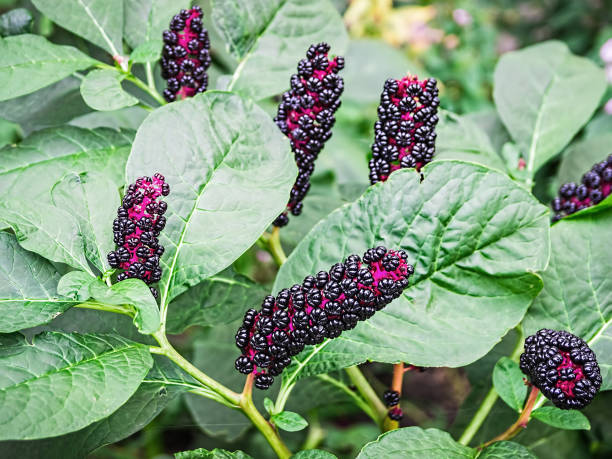Common Names: Poke Root, Pigeon Berry, Garget
Habitat: India, Brazil, North America
Phytolacca decandra, commonly known as Poke Root, is a flowering plant from the Phytolaccaceae family, often grown as an ornamental plant. Its traditional name, pocan, originates from the Algonquian language, meaning blood red, referring to the deep color of its berries.
Parts Used
-
Root (primarily)
-
Berries (without seeds)
Taste/Smell: Acrid
Chemical Constituents
-
Alkaloids: Phytolaccine
-
Formic Acid
-
Lectins & Glycoproteins
-
Phytolaccic Acid
-
Resin
-
Saponin
-
Tannin
-
Vitamin K
Therapeutic Actions
-
Alterative: Helps cleanse and purify the blood.
-
Anti-inflammatory: Reduces swelling and inflammation.
-
Antiviral: Inhibits replication of viruses such as Influenza, HSV-1 (Herpes Simplex Virus), Upper Respiratory Infection viruses, and Poliovirus.
-
Cathartic: Promotes bowel movements.
-
Immune Modulator: Stimulates both T-cells and B-cells, enhancing immune defense.
-
Lymphatic Stimulant: Aids in tissue detoxification and lymph drainage.
-
Supports Cytokine Production: Stimulates the release of interleukin and tumor necrosis factor, key elements in immune response.
Clinical Indications
Phytolacca decandra has been traditionally used to help manage:
-
Cancer Prevention
-
Endometriosis
-
Fibrocystic Breast Disease
-
Herpes Simplex Infections
-
Mastitis (breast inflammation)
-
Uterine Fibroids
-
Influenza and Viral Infections
-
Lymphadenopathy (swollen lymph nodes)
-
Mumps and Parotitis
-
Pharyngitis and Tonsillitis
-
Upper Respiratory Infections
Speech Disorder
A speech disorder, also known as a speech impairment...
ADHD
Attention-deficit / hyperactivity disorder (ADHD) is a...
Cerebral Palsy(CP)
Cerebral palsy (CP) is a group of neurological disorders...
Cancer
Cancer is a broad term for diseases where cells...




